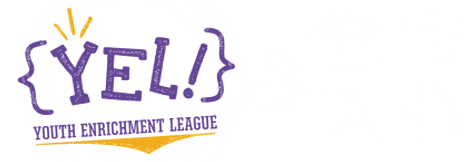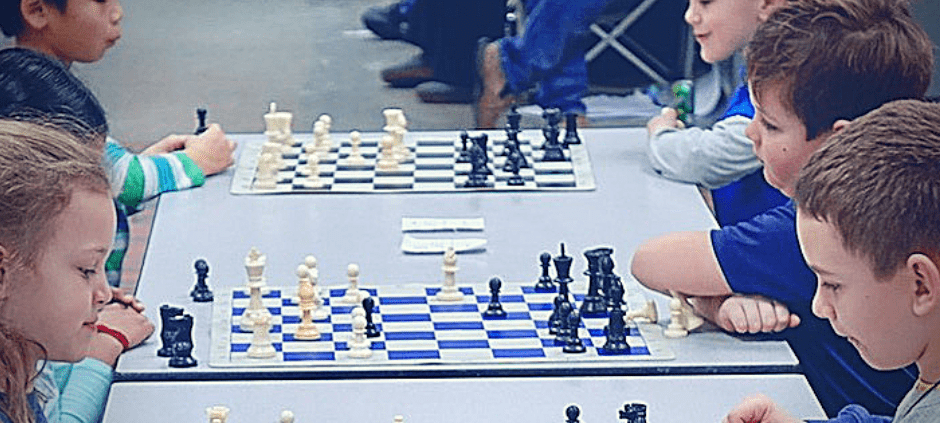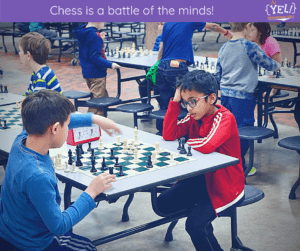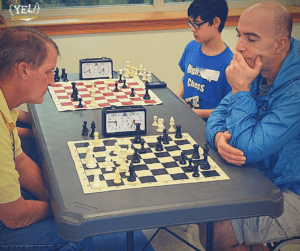Yes! Your Child Can Play (and enjoy) Chess.
There are many misconceptions surrounding the ability to play chess.
-
Only smart kids play chess.
– At {YEL!}, we believe that every child has certain gifts they are given. We see enrichment as an opportunity to channel those gifts. ALL kids are smart kids. While there have been numerous studies claiming that chess may improve intelligence, especially in young children (see 10 Big Brain Benefits of Playing Chess or Compilation of Chess and Education Research Studies), there is little doubt that chess will improve your child’s concentration, and she/he will learn to be less impulsive about their next move as well as the moves made by their competitor. This will, in all probability, transfer positively into their daily life.
-
Chess is hard to learn.
– Actually, our nearly two decades of experience working with all types of students from rural communities to wealthy suburbs and everything in between, tells us that many children pick up what chess is all about much quicker than even they anticipated. Once they learn the names of the pieces, the rules around how they travel the chess board, and some basic strategies, it almost becomes second nature to them. Our teachers at {YEL!} tell us regularly how even kindergarten and first graders can grasp the game quickly. And the more they play, the more they’ll be hooked on this fun activity, often challenging their parents to play against them at home. Get ready! We hear from many parents how their child either gives them a run for their money or even gets a win after studying with {YEL!} for just a few months.
-
My child is too young to play chess.
– Not true. Plain and simple. In fact, the earlier your son or daughter begins learning chess, the better they will play as they grow older. For me, I starting teaching my children the names of the pieces at age three using a Super Mario Chess Set. At age four we started talking about how the pieces move. At age five, how all of the pieces move, piece-capture and check. Now, to be sure, there was a lot of “Space Chess” and Mario Kart chess mixed in, but starting early got them interested and they’ll have chess as a game to play for a lifetime. NOTE: My middle child enjoyed it so much, he made up his own chess puzzles.
- Chess is a life-long game where you learn something new every day. It’s like riding a bicycle. Each bike ride (or chess game) presents it’s own set of twists, turns, and bumps along the way. And it’s fun at the same time!
-
Competitive sports are where it’s at.
– Well, you may personally like hockey, basketball, soccer or baseball, but these great “team” sports aren’t for everyone. Some kids prefer one-to-one competition, find team play confusing, or just don’t

Chess is a battle of the minds!
enjoy sports with a ball (See Benefits of Fencing with Ro Sobalvarro for additional ideas) … and no one can convince us that chess isn’t competitive. It’s a battle of the minds, and it will help to improve patience and focus. If your kid doesn’t exhibit either of these traits right now, they may develop them over time playing chess. And they’ll make new friends in a smaller group environment.
-
Can you play traditional sports and chess?
– Absolutely. NFL Running Back, Adrian Peterson, plays chess to relax during down time. The Edina, MN girls high school hockey team actually employed {YEL!} coach, Igor Rybakov, to teach them chess and with the goal of helping their focus, concentration, and strategic thinking. Personally, my classes have been filled with multi-sport athletes who enjoy making layups just as much as finding checkmate.
-
It promotes good sportsmanship.
– Chess tournaments don’t have a referee who throws a flag or blows a whistle when there is a penalty. Chess players have to follow the rules themselves and mostly referee their own play. If an error or illegal move occurs and the players can’t rectify it themselves, they will call in the tournament director to make a judgement on the game. If a player disagrees with the tournament director or doesn’t follow chess tournament etiquette, they may be asked to forfeit a game or even be removed from the tournament.
- At {YEL!} Chess Tournaments and in our classes, we ask students to shake hands at the beginning of each game and at the end of each game.
-
But are there are real benefits to playing chess?
– Absolutely, positively, YES! These days it seems like there’s a study about almost everything, and they all claim incredible benefits. Considering that chess has been around since 6th-century India, there’s hundreds of years of studies into the benefits of the game. There has been a proven strong correlation between chess and increasing your IQ. Chess is also known to improve your memory, stem

Chess is for adults and youth.
Alzheimer’s, and increase creativity, as it exercises both sides of the brain.
-
As a parent, what’s in it for me?
– Well, to begin with, chess doesn’t require expensive equipment, uniforms, or contributions to things such as practice ice time. Even better yet, your car and house won’t smell like a locker room, and chess doesn’t make for seemingly endless piles of laundry. But perhaps most importantly, chess is the same for girls and boys, and will improve their confidence as they learn more and more exciting strategies that will be potentially useful for many decades of playing the game. There no best size or shape to play chess. Just a willingness to learn and have fun at the same time.
Signing your child up to learn chess with {YEL!} may be one of the best decisions you make for them. One that they’ll be thankful for, for many years to come.

 2019 {YEL!}
2019 {YEL!}


